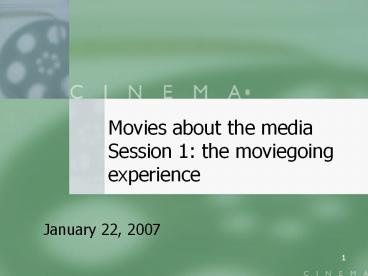Global entertainment industry. A ... Movies as entertainmen - PowerPoint PPT Presentation
1 / 29
Title:
Global entertainment industry. A ... Movies as entertainmen
Description:
Global entertainment industry. A ... Movies as entertainment ... Tonight's featured film. The Purple Rose of Cairo (1985; dir. Woody Allen) 27. Woody Allen ... – PowerPoint PPT presentation
Number of Views:210
Avg rating:3.0/5.0
Title: Global entertainment industry. A ... Movies as entertainmen
1
Movies about the mediaSession 1 the moviegoing
experience
- January 22, 2007
2
Lets watch something
- First 10 minutes of Crash (2005 dir. Paul Haggis)
3
Lets read aloud
- Pp. 1-6 of Ohlin Smith article
4
Now lets re-screen Crash
- As we read Ohlin Smith pp. 6-10 (top)
- Well step through Crash
- Chapter 2 gun store, Westwood confrontation
- Chapter 17 shooting with cloak
- Chapter 1 opening credits, Cheadles VO
5
Syllabus/calendar
6
What is a movie?
7
Heres a fun (?) quote to consider
- The movie is a pastime for helots, a diversion
for uneducated, wretched, worn-out creatures who
are consumed by their worries . . . a spectacle
which requires no concentration and presupposes
no intelligence . . . which kindles no light in
the heart and awakens no hope other than the
ridiculous one of someday becoming a star in
Los Angeles. (Georges Duhamel, French author,
1884-1966)
8
What film scholars would say about film
- Complex form of artistic representation
- Complex form of communication
- Global entertainment industry
- A modern art
9
Purposes film can serve
- Outlet for personal expression
- Shaper of mass culture of entertainment and
celebrity - Educator
- Critic
- How?
- How does film criticize?
10
What does film do to us?
- Transports us to fantasy worlds (kingdom of
shadows) - Romance, action, science fiction
- Lets us realize our dreams
- Challenges us intellectually and aesthetically
11
The moviegoing experience
- Jowett Linton (1980) argue that movies are a
social (group) activity - Offer sense of occasion
- Excuse to take a partner
- As opposed to TV
- An often solo medium
- And less readily an occasion
12
Movies make audiences into a community
- What does that mean?
- Serve as tools of social integration
- What does that mean?
13
Psychological powers?
- JL discuss why movies are powerful
- Vivid visual imagery
- Manipulate of emotions
- Play on audiences expectations and desires
- Create and reinforcing stereotypes
- Operate as dreams
14
Visual-technical aspects of moviegoing
- Colin McGinn
- We dont look at movies (whereas we do look at
TV) - We look through or look into movies
- In a way that may be analogous to looking
through/into water, fire, sky, mirrors, other
peoples eyes
15
The power of vicarious involvement
- Objectives of moviemaker persuading the viewer
to - cross the distance that separates the viewer from
the screen - imaginatively enter the story world
- vicariously experience the events occurring in
that world - (Jowett Linton, 1980, ch. 4)
16
How/why does that happen?
- Identification with stars, situations, story
types - Displacement of attention
- we ignore technique and style
- and pay attention almost entirely to
narrativeWhat do JL mean by this?
17
Movies as analogous to dreams
- Through fantasy, they fulfill dreams (wishes) of
audience - Symbolize hidden fears and desires
- Act as sources for our real dreams
- Give us material to dream about when we sleep
18
More obvious power
- Movies as entertainment
- Diversion, escapewe step away from our real
lives and real problems for a few hours
19
Movies more mirroror shaper?
- Ongoing discussion in media studies more
generally - Are we shaped by our mass media, or do we shape
them? - Why might it be said that movies reflect
society as much as (maybe even more than) they
shape society?
20
Why do movies reflect?
- Theyre a business!
- As much as filmmakers might dare to be original,
they still need to sell tickets - And must be able to gain widest level of
acceptance by largest possible audience - (they cost too much to produce to NOT be popular)
21
So movies must, to some degree
- Be somewhat predictable
- Include familiar, popular, comfortable themes
- Feature people not too radically different from
their audiences - Give us stars we can identify with
- Include only enough innovation to be
interestingbut not too much!
22
And also
- Not be too challenging
- intellectually
- stylistically
- politically
23
A not uncommon scholarly view
- Popular U.S. films operate as dramas of
reassurance. The beliefs, attitudes, and values
presented in Hollywood films tend to resonate
with the dominant beliefs, attitudes, and values
of American society. - In other words, the dominant ideology of a
society tends to be reinforced by the ideology
presented in its films. (James Linton, 1978)
24
How does this apply to movies about the media?
- Do movies simply serve as a window in the media?
And thus - Do they simply confirm what we already believe
about - TV
- Movies, stars, Hollywood
- Journalism
- Advertising and PR?
25
Or
- Might movies actually shapeand possibly even
distorthow we understand our mass media? - And if so, what would be moviemakers motivations
for doing so?
26
Tonights featured film
- The Purple Rose of Cairo (1985 dir. Woody Allen)
27
Woody Allen
28
Some other Allen films
- Sleeper (1973)
- Hannah and Her Sisters (1986)
- Manhattan (1979)
- Annie Hall (1977)
29
Allen and the media/showbiz
- A sentimental streak
- Purple Rose of Cairo
- Radio Days (1987)
- Play It Again, Sam (1972)
- Yet also a cynical side
- Celebrity (1998)
- Hollywood Ending (2002)
- Zelig (1983)
- Scoop (2006)































